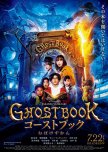
Juvenile 2.0
Ghost Book feels deeply reminiscent of Yamazaki's debut film, Juvenile (hell, even the adorable little Tetra makes a cameo appearance), a lighthearted family romp often dealing with some relatively difficult themes for its target audience. There's an element of Pokémon thrown into the narrative with the film's characters tasked with "catching them all", benefiting this narrative hook is the lovely monster design, stellar voice work by legendary voice actors such as Akio Otsuka and Rie Kugimiya; and their impressive realisation capturing the essence of Etsuyoshi Miyamoto's original illustrations brilliantly. Unfortunately, the characters are all exceptionally one note, despite the cast's rather heartwarming performances they are probably the most laid-back group of ghostbusters ever, often characterised by very limited personalities (I swear Kudo is just a few steps away from being a full blow serial killer) or singular traits. There's no urgency with this film, it just kind of chugs along at its own pace, often leaving room for a nice family dinner despite the race to get home. That being said, Ghost Book operates on a level of childish fun, obvious in its sentiment and simplistic in its messages. However, it makes up for its narrative wateriness with a wholesome vibe you can't bring yourself to hate.Esta resenha foi útil para você?
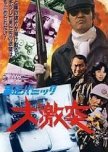
As fast and lethal as the banker robbers it depicts
One of Kinji Fukasaku's lighter and more comedic works, Violent Panic: The Big Crash is an unrelenting and fast-paced slice of vehicular mayhem, one that feels right at home in his crime-ridden filmography. It's classic Fukasaku from start to finish, just dropping the Yakuza subgenre that often defined his works. Despite the departure from the said genre and the film being a bit of a mess tonally in the first half, Fukasaku still creates a gripping world of slick, charismatic characters. It's a film filled with brutal, quick-to-the-trigger, cigarette-breathing bank robbers, and Tsunehiko Watase is a star among them. He walks the line between enthralling and too ruthless well as he robs his way through Japan. The characters in the second act are often one-note or clash with the gritty crime world Fukasaku paints, but few diminish from the atmosphere of danger throughout the narrative thanks to Fukasaku's trademark urgent and frantic camerawork being out in full force, from its thrilling bank robberies to its outstanding car chases, he puts the audience square within the chaos. From the mix of funky grooves to slow spaghetti western ballads on the soundtrack, Violent Panic: The Big Crash furthers Fukasau's stylish legacy with one hell of an entertaining ride, as fast and lethal as the banker robbers it depicts.Esta resenha foi útil para você?

HK cinema is back baby!
I'm so happy to see a modern Hong Kong film that remembers it's a Hong Kong film and not a pretender to the throne, an action-packed homage to the nitty-gritty choreography-crazed neon-daze of '80s Hong Kong cinema, Twilight of the Warriors: Walled In is a long overdue and very welcome dose of ass-kicking goodness, hopefully signalling the start of a new wave. Packed with wall-to-wall bone-crunching, wall-shattering mayhem, dizzying feats of acrobatics and martial arts madness, the film might be a bit long but it's extraordinarily stylish, seamlessly edited and viscerally exciting. It's all directed to masterful effect by Soi Cheang, his nimble camera swimming through the walled city with a hyperkinetic frenzy that balances the excellent action that brings you closer to the edge of your seat with every punch and every kick and the misery enacted by neo-liberalism and cold vicissitudes of fate. A bittersweet dystopian canvas, but also the purest action machine built on the choreographed denial of physics. The cast is all excellent with veteran stars Louis Koo and Sammo Hung giving as good as they get, however, it's Philip Ng who makes the biggest mark as a cackling villain with supernatural abilities, even if his ascension to villain doesn't feel entirely warranted. The musical score by Kenji Kawai is utterly joyous and so typical of his masterful touch, I especially loved the use of Walking in the Air as part of the underscoring. If anything, Twilight of the Warriors: Walled In proves that Hong Kong cinema is far from dead, and not every film the country produces has to be subjected to a Mainland committee's scrutiny. It's easily one of the best action films of the year and I'm annoyed it took me this long to watch it.Esta resenha foi útil para você?
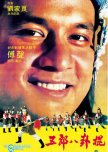
One of the Shaw Bros' finest hours
I've often seen The 8 Diagram Pole Fighter ranked as one of the Shaw Brothers' finest productions. Despite the troubled production that the film endured after the tragic loss of Alexander Fu Sheng, this swan song to the old-school martial arts epic is every bit as great as I'd ever hoped it would be. It captures the viewer's attention from the beginning, as it shifts from the introduction of an eerie prophecy to a scene of betrayal to the Battle of Jinsha, a delightfully surreal action sequence that was unquestionably filmed on a barebones Shaw Brothers soundstage, from the unbelievably choreographed, ferocious and opera-like opening battle scene to the teeth-ripping finale, everything in this film worked. The interwoven contemplation of Buddhist ethics gives the film a thematic hook that goes beyond the typical 3 stage revenge drama plot mechanics that typify many of these films, the extended debate operates as a thinly-veiled metaphor for the monks' position with the outside world. Themes of loyalty run throughout with revenge never far from the surface. This certainly ranks up there as one of Lau Kar-leung's best-directed films, even with the significant loss of Alexander Fu Sheng, the film rebounds well, the choreography is frequently fantastic and the ever-reliable Gordon Liu delivers an outstanding performance as the lone lead with Kara Hui in a welcome supporting role. Not all Shaw Brothers films are created equal, but The 8 Diagram Pole Fighter could very well be considered the staff bearer for the studio, it really is fantastic.Esta resenha foi útil para você?
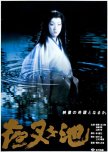
A fable of human love caught in the current of nature's wrath
An adaptation of the 1913 play of the same name, Demon Pond blends theatrical artifice with cinematic surrealism offering a compelling lesson in the power of superstition and mythology; defined by a pervasive tension between the ancient and the modern, superstition versus scientific reason, an aquatic tale of life and death. We live as long as we have it, but if we lose it, we die, except the film's true subject is love. We can live without it, but is that really living? In Masahiro Shinoda's lush, romantic, bigger-than-life take on Izumi Kyōka's text, the answer is a resounding no. What starts as a folk horror fantasy with a psychological thriller vibe gradually shifts into full-on action-adventure-meets-disaster film mode once all watery hell breaks loose. Shinoda's is extraordinary in its dreamlike decadence, it's the kind of film that could get by strictly on aesthetic terms, such a feast for the eyes and ears, that it almost wouldn't matter if the story didn't make much sense or even had one to begin with. Set to the swirling strains of Isao Tomita's utterly hypnotic synth score and bolstered by some great acting from its cast, Demon Pond is a fascinating experience; one that arguably runs a little long at two hours, but which remains endlessly captivating thanks to its beauty, elegance, and portrayal of a fable of human love caught in the current of nature's wrath.Esta resenha foi útil para você?
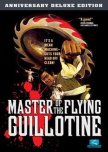
Uncut edition
One of the most iconic cult martial art films of all time, the influence felt by Master of the Flying Guillotine can still be seen in pop culture to this very day. Nothing captures the imagination of genre fans like the notion of a mechanical device being hurled through the air to behead its victims. With its nonstop flurry of fighting, ersatz bloodletting and incidental hilarity, this sequel to Jimmy Wang-Yu's earlier One-Armed Boxer doubles down on what made that film work, ultimately leaving this film as his most fondly remembered and signature work, very few films can compete with having a one-armed hero, a blind antagonist who wields a Flying Guillotine and a stolen Krautrock on its soundtrack. The main plot is completely nonsensical and only serves as window dressing for the film's bloody trail of vengeance and tournament antics, one that Yu directs with exhilarating energy. After a series of ultra-cool martial arts set pieces, choreographed fiercely and imaginatively by Lau Kar Leung, Yu eventually faces Kam Kong in an awesome coffin-tossing, wall-climbing, one-arm boxing, guillotine-throwing finale. As writer, director, and star Yu proved to be an extraordinary showman whose creativity, experimentation with genre conventions, and knack for surrounding himself with great talent results in a recipe for a marvellously manic film, Master of the Flying Guillotine needs to be seen to be believed, and even then defies belief.Esta resenha foi útil para você?
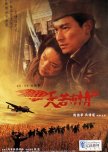
Certainly better than II
Rather than offering a retread of the original film as the first sequel did, A Moment of Romance III goes in an entirely different direction. Don't expect motorcycles racing down the streets of Hong Kong, Taking the basic set-up of the first and transplanting it into a romantic period piece under the cover of a Spielbergian visual aesthetic. Despite the overly hackneyed set-up, the film proves to be decent fluff, jettisoning director Benny Chan in favour of the series' producer, Johnnie To who provides the film with plenty of lavish production values. While the script and story may be pretty generic, To makes the best of it and provides some nice war action and plenty of tear-jerking drama. Although he's seemingly set in brooding mode for most of the runtime, bringing back star Andy Lau was a great move as the chemistry between him and the returning Wu Chien-Lien, also on top form throughout, is undeniable. Eventually, everything gives way to your standard "choice of love" type deal with one of our two parties running to a romantic reunion. Ultimately A Moment of Romance III is extremely sappy but anyone chasing pretty stars and heart-wrenching pathos will not be disappointed, it's certainly a more worthwhile time investment than II.Esta resenha foi útil para você?
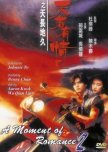
Disappointingly unfocused
Right out of the starting gate, it's hard not to be disappointed and perhaps even slightly insulted by A Moment of Romance II. It's horribly unfocused, sharing very little of the original film's excitement or romance along with contrived plotting that doesn't add up to more than manufactured pathos. While the first film at least had some thematic and dramatic justification for its tragic resolution, this one seems to follow a similar pattern to get a rise out of this audience. It doesn't work; you have to care about the characters first. Johnnie To certainly didn't ghost-direct this one... That being said, this is far from a poorly made film, Benny Chan does a more than decent job in the film's direction. The actors all do a decent job with the material given even if Aaron Kwok isn't a real replacement for Andy Lau, the real highlight is the typically slimy Anthony Wong, and the music by William Wu does evoke some form of emotional resonance. Sadly, A Moment in Romance II spreads itself too thin; one that doesn't work as a romance or a thriller, a tragic case of a film trying to be everything to everybody, and ending up as a bit of nothing to no one.Esta resenha foi útil para você?
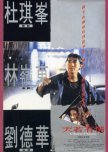
Far more than a teenybopper romantic fantasy
One of the most imitated and popular Hong Kong productions of the 90s, A Moment of Romance sees a modern-day Romeo and Juliet-style tale under the veil of contemporary underground Triad warfare, far more than a teenybopper romantic fantasy. In many ways the film is responsible for many a cliché within its industry; a disaffected youth, the good girl romantic interest and a cartoonish villain, however, it's the way these clichés are all assembled within the film that makes it so memorable. "Director" Benny Chan has his way with the clichés and throws in enough slow motion, syrupy Cantopop music video montages and hyperemotional crescendos to tax even the weepiest audience member. The core emotions that the film mines are so innately compelling that they're not lost beneath bombastic montages or sudden flashes of gangland violence. It's often stated this was heavily ghost-directed by Johnnie To and it's not hard to see why, so much of the film carries many of his later stylings. The film works because it is a consciously chosen cinematic style and is used without fear with all available means with the superb cast all delivering perfect performances to compliment. Andy Lau brings righteous anger and hidden tenderness to an exceptional genre character. What's so compelling about the character and the performance is that Wah Dee acts and very rarely talks. His decisions have believable and compelling consequences with the affirmation of Dee's morality coming with a price, and only one outcome is truly possible. Put simply, A Moment of Romance has it all; fiery action, sweeping cinematography, an unforgettable love story and beautiful chemistry, quick-witted humour, a beautiful score and more. The film triumphs, not despite its genre excess, but perhaps because of it.Esta resenha foi útil para você?
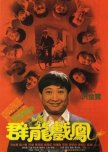
As entertaining as they come
You know your film is off to a strong start when you aren't even 5 minutes in and it's already staging its own lightsaber fights, albeit with fluorescent bulbs. Marking the end of Sammo Hung's greatest period as both star and director with a mighty bang, Pedicab Driver exemplifies the type of cinema that Hong Kong loved during the 80s. What that means is it's a mismatched series of bizarre comedy, heightened emotions, sudden tragedy and yes, incredible fight scenes. The extended fight between Sammo and Lau Kar-Leung in the gambling den stands as one of the film's most memorable moments, despite its complete irrelevance to the plot. Although it seems a little overambitious at times in its storytelling, with several seemingly unrelated threads running parallel, the film does manage to hold it all together in a way that only Hong Kong cinema can. While the story threads are certainly only diversions from the main spectacle, they do enhance the film somewhat, thanks largely to the cast's terrific performances and great music. It all starts happy-go-lucky but by the end, revenge is the name of the game and it is one Sammo delivers tenfold with some fantastic direction. For its uneven mishmash of genres and tones, Pedicab Driver succeeds wholeheartedly thanks to its easily empathetic and loveable characters and their plights, it's as entertaining as they come and features something for everyone. While not quite a masterpiece it is well worth seeing.Esta resenha foi útil para você?

A celebration of love
Falling in love is easy; falling out of love is harder. This is where Comrades, Almost a Love Story succeeds; its tragic beauty is undeniable. It's a heartfelt story of two mainlanders caught in fate's grand design, an incredibly moving film full of soulful looks, lingering glances and averted eyes. Director Patrick Chan and writer Ivy Ho throw every romantic convention imaginable into the film, Chan's direction remains restrained and respectful, holding back from too much sentimentality; while Ho's script is rich with wonderful details, drawing upon the culture and the history of recent Hong Kong. Although she eventually falls upon clichés to bring the film full circle, the plot devices don't feel like plot devices but combined with a beautiful piano-laden score means its no deal breaker. Maggie Cheung is wonderful here; her luminous screen presence just lights up the film, while Leon Lai turns in an admirable performance of his own, although occasionally wooden at times, it's lovely to see him inhabit such a real character. Destiny is a force that fascinates Hong Kong, which is understandable as they've felt themselves swept along by the river of history, with little or no control over their eventual fate. Yes, there's a certain drag to it and sometimes it's even a little melodramatic but ultimately Comrades, Almost a Love Story is a wonderfully beautiful celebration of love and all the challenges it brings.Esta resenha foi útil para você?
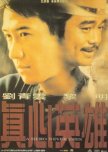
Heroes never die, they live forever
Just as much a tribute to the heroic bloodshed films of yesteryear as it is a brilliantly stylised entry in its own right, A Hero Never Dies is a pure exercise in genre film despite being so hard-boiled that it almost becomes a comedy. Taking a fundamentally tried, tested and clichéd story in a world where the violence is more sudden and the atmosphere much darker and upending nearly every element of the films he's paying homage to, shows the power of Johnnie To's filmmaking ability. To's direction is fantastic with plenty of sweeping camera movements and tremendous use of colour, all coupled with Cheng Siu-keung's outstanding photography make the film a feast for the eyes. The incredible sense of loyalty and honour these characters display ultimately makes them “heroes", the themes are often hammered home so relentlessly that the film nearly enters the realm of parody. Only in a gangland fantasy would characters enjoy a friendship but have no qualms about killing one another later. The performances from its central cast are phenomenal, Leon Lai and Sean Lau especially, both playing fundamentally different archetypes of the same profession to immense effect, all the while Raymond Wong's hauntingly powerful score dominates the sound mix, even if he does repeat a few too many cues from his work on Running Out of Time. A Hero Never Dies ultimately just solidifies to me that Johnnie To is one of, if not the best post-handover filmmaker in the industry. Heroes may die, but their actions live forever.Esta resenha foi útil para você?
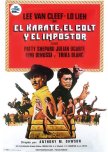
Brilliant fun
A bizarre concoction of comedy, martial arts, and spaghetti western action, The Stranger and The Gunfighter is hard to fault in terms of sheer entertainment value, one that works because, unlike other Shaw Brothers collaborations, ergo Legend of the 7 Golden Vampires, it doesn't take itself too seriously. Most of the comedy is daft, but there are a few inspired jokes littered throughout, even with the rather repetitive script the film never wastes too much time in one spot, leading the two heroes from one fantastic set piece to another with an admirable pace. The film makes the best of the opposition between the polite, dutiful Easterner and the selfish, roguish Westerner, but without making any serious socio-cultural statements. It helps enormously that both Lo Lieh and Lee Van Cleef are the leads, Cleef is especially funny in the film which makes a nice change from his roles as the villains and stoic characters in his earlier spaghetti westerns while Lieh is just as awesome as he always is. Antonio Margheriti's direction is pretty great but the unfortunate grotty transfers this film has been confined to do his work a major injustice at points as his photography of the Almeria locations gives the film a paramount look which works exceptionally well with Carlo Savina's fun score. A well-balanced mix of exploitation comedy, The Stranger and The Gunfighter is well worth a look for aficionados of either genre.Esta resenha foi útil para você?

A cautionary parable for man's true acquiescence to the natural world
Toshiharu Ikeda's elemental and mythical adaptation of Takashi Ishii's Angel Guts manga, Mermaid Legend, evokes a lyrical sadness for the fading way of life of seafaring fishermen and ama divers. One that starts as a relatively tender study of grief but shifts dramatically in the latter half to become an absolutely brutal exploitation blood-drenched angel of vengeance and yet, despite those exploitation tendencies, it also channels the intense anti-nuclear sentiment of the decade. An eco-thriller that finds the incursive grasp of industrialisation and corporate greed encroaching on natural realms. Ikeda directs a film that begins a presentation lingering somewhere between the realistic and the idyllic, almost artful in several scenes but it's not long before the film shows its true colours, which are essentially bathed in the red of blood. Mari Shirato gives an astonishing performance as Migiwa, managing to capture everything from sorrowful and vulnerable as much as vengeful and unstoppable, a real shame she wasn't in more. Combined with a truly haunting piano score by Toshiyuki Honda, Mermaid Legend remains a brooding requiem for loss, a cautionary parable for man's true acquiescence to the natural world.Esta resenha foi útil para você?
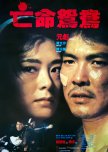
Esta resenha pode conter spoilers
Simply magnificent
I genuinely can't believe I put this film off for so long! A darker-than-dark neo-noir thriller, On the Run, is exactly the kind of film I adore one that's raised to another level by an incredibly dark sense of humour and a knack for doing the unexpected. It takes you for a ride, managing to assault, frustrate and delight regularly never ceasing to be entertaining or compelling. It's far from uplifting, a constant overhanging anxiety plagues its characters from the then-upcoming Chinese takeover of Hong Kong, even in 1988 they were worried about the future, it gives the film a suitably grim atmosphere even in the face of its stunning visuals. It's so weird to think that Alfred Cheung was more well-known for his comedies because watching this you honestly wouldn't know it. He perfectly complements the gloomy theme with dark cinematography of the black, Hong Kong horizon dimly lit with the traditional glow of neon lights. It is almost impossible to not be utterly captivated by its mood. As much as this is one of Yuen Biao's finest performances, the film is absolutely stolen by Pat Ha; displaying an intense physical presence throughout as a cold-blooded hitwoman with a heart of gold that commands incredible respect and sympathy. Aside from an incredible pole-slide stunt performed midway through by Yuen Biao, all the action is played with a brutal realism that's nothing short of spectacular, especially that final fight. Featuring a brilliantly crafted script that moves at lightning speed and a truly unforgettable musical score by Violet Lam, I cannot find myself praising On the Run enough, it's simply terrific.Esta resenha foi útil para você?





